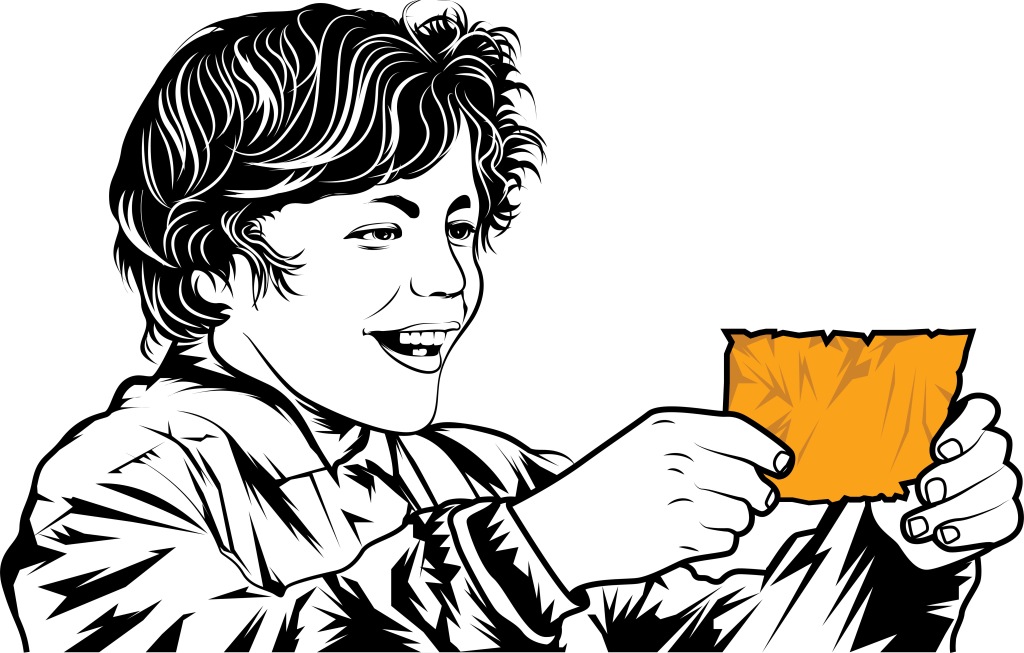
Charlie and the Chocolate Factory
A once-in-a-lifetime opportunity opens up to go to the most prestigious chocolate factory in the world. Everyone wants to go, but there are only a few places available. So, a lottery is set up in the style of a treasure hunt for one of five Golden Tickets, hidden away in the wrappers of Wonka’s chocolate bars. Whoever you are, if you buy a chocolate bar, you can find one of those tickets and gain access to Wonka’s factory.
For a fleeting moment, this sounds like an elegant way of levelling the playing field. Wonka could have simply invited his friends and family, or perhaps influential politicians or industrialists. But he doesn’t; he chooses to randomise the selection process and make it possible for anyone to make it. It’s an inclusive gesture and possibly the most profitable marketing campaign ever.
In the end, five children (as it happens!) get the Golden Tickets, including a well-mannered but underprivileged boy called Charlie. He’s so poor that the closest he can get to the prestigious factory is through the chocolate bar he receives once a year on his birthday.
So far so good? Let me try and sum up the story in one final sentence: The other four children were all ill-mannered and undeserving, and in the end, Charlie becomes the worthy heir to Wonka.
So, where did Wonka go wrong?
This week, I have asked several students and colleagues (if they have read the book) what the story’s moral is. Answers (by the way) have ranged from “don’t eat too much chocolate or you will pop” to “in the end, good kids will get what they deserve and bad kids will get what’s coming”.
Neither of these comes to my mind when thinking about the book. Notwithstanding the well-documented racism and exploitation evident within the book (which I will leave to others who can, who do, and who will speak to this better than me), as a child reader, I could never get my head around the inherent unfairness of Wonka’s lottery.
Because Charlie eventually wins the game (as it were), we quickly forget how ridiculously lucky that boy was against all the odds. Charlie can only afford one chocolate bar per year. In the story, he ends up having two lots (after fortuitously finding some money, someone has dropped on the ground (hang on, shouldn’t he have handed it in??)). On the other hand, the unlikable Veruca Salt’s dad had the wealth to purchase several million lots. Are Charlie and Veruca equally deserving of their place at the factory? Of course not!
The real moral of the story for me was that the more money you have, the luckier you will be at getting what you want in life.
Wonka, an apparently enigmatic genius, was just like the rest of the industrialists. Otherwise, he surely would have found a way to make his Golden Ticket lottery fair. This one was stacked in favour of those with wealth and privilege.
But this wouldn’t happen in real life.
Really? It’s exactly like real life.
Let’s take the university admissions process for elite, prestigious universities. In many ways, they are similar to the Wonka-model, where wealth and privilege continue to make it more likely (not less) to win a Golden Ticket at a time when the rising demand for places means that the %acceptance rate of applicants is reducing annually. Every which way you look at it, the system appears stacked.
In real life, for every Charlie that makes it, tens and thousands of Veruca Salts make it too. And in real life, there are as many obnoxious and undeserving Charlies as humble and hardworking Verucas. In real life, only those with power can make decisions to change the current self-serving status quo. That’s just one of the reasons why the Wonka story irritates me so much. Too many people take away the wrong lessons from it!
Michael Sandel, of Harvard University no less, in his best-selling book The Tyranny of Merit, made global news headlines in 2020 with a proposal to dismantle the ‘sorting machine’ that higher education has evolved into by introducing a lottery-based admissions process at Ivy League and other top tier universities. In short, applicants hitting a minimum admission threshold are entered into a lottery from which candidates are drawn —the winners are admitted, the losers are not.
Sandel’s intentions are clear: by injecting (genuine) luck into the admissions process, merit is reduced to nothing more than a ‘threshold qualification, not an ideal to be maximised’. In turn, Sandel suggests, meritocratic hubris will wane as applicants realise their success was not wholly their own doing, thus sparing unsuccessful candidates the humiliation of failure. Perhaps more importantly, however, the admissions lottery would stop the valorisation of college degrees by making the prospect of their attainment a matter of chance, severely weakening the credentialist worldview that talent and effort are the only prerequisites for succeeding beyond school.
At the same time, I’ve read some reasonably robust counter-arguments to Sandel and the concept of introducing chance to the college admissions system. Here’s one that gives Sandel a run for his money.
But I really, really, really enjoyed this article here, which provides some more nuanced ways that 1) college access can be made fairer and 2) might help reduce some of the debilitating mental health being caused to those children going through the current system.
Both of these issues – mental health and equity – are issues that I care deeply about as a parent and school leader. If there is a way to improve both, I’m in.
I have been in two minds about letting Wonka have the final say. But here goes:
“I don’t understand it. The children are disappearing like rabbits. Well, we still have each other. Shall we press on?”
Follow Serendipities by Email
Enter your email address to subscribe to this blog and receive notifications of new posts by email:
